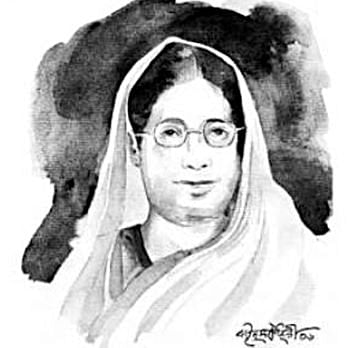The relevance of Rokeya's legacy
The relevance of Rokeya's legacy

NO comprehensive research has thus far been undertaken to discover forgotten Muslim women writers of Bengal. As a result, most of the Bengal Muslim women writers of the past have remained shrouded in the mists of time. From among those who are better known and researched than others, one of the most prominent names is Rokeya Sakhawat Hossain (1880 – 1932).
Rokeya's literary career stretched three decades (1902 – 1932) and her works span all major literary genres. In terms of resilience and courage confronting oppressive patriarchal hegemony, overcoming the social and pseudo-religious barriers against women's right to education, and fighting against their legal disabilities, perhaps, Rokeya stands incomparable in the history of the women's liberation movement.
As part of her struggle for female education, Rokeya set up a successful institution. However, it was an uphill battle for Rokeya to found her Sakhawat Memorial Girls' School and to convince parents of the need to send their daughters to the school. Sensing her compelling passion for female education, her forward-looking husband Sakhawat Hossain set aside Rs. 10,000 (a good sum of money at that time) for her to establish one.
Rokeya started educating girls in Bhagalpur in 1909. But she could not continue educational activities there for long, due to stiff social opposition compounded by the mistreatment she received from some of her in-laws after husband's demise. Eventually, she had to leave Bhagalpur and settle down in Calcutta where she started Sakhawat Memorial Girls' School in 1911 with eight students.
What makes Rokeya unparalleled among all those who fought for women's rights is her indomitable, unswerving courage and sustained activism against the established system. In order to create awareness among Muslim women she walked from door to door and organised them under the banner of Anjuman-i-Khawatin-i-Islam (Islamic Sisters Group). She did this at a time when women's participation in such organisational or political work was unimaginable.
The cultural context in which Rokeya struggled for women's rights and educational opportunities is important. Negative attitude and hostility to female education on the basis of wrong interpretation of Islamic texts was overwhelming in the entire British India. The champion of Muslim educationist Sayyid Ahmad Khan (1817-1898) understood the need for female education and women's empowerment. But he dared not advance female education fearing that such a move might thwart his entire education agenda.
In this respect, compared to all social reformers of the region, Rokeya was extremely courageous and refused to give in to the patriarchal power structure. She waged an all-out war against women's passivity, their incarceration in the domestic enclosure, lack of access to educational opportunities, restrictions placed on their role in public life, and against the legal and social discriminations against them.
In today's Bangladesh, one of the greatest challenges for establishing women's rights now is to ensure women's security in domestic and outside spheres and to create a congenial atmosphere for them to realise their potentials and gain self-confidence. Rokeya helped women obtain education and become involved in public life. She broke the wall of domestic incarceration and brought women out of domestic confinement. But the need to challenge structural and systemic violence is not over. What is more, women of poor economic background have not had an equal share in the gender equality achieved so far.
In addressing gender-based violence and marginalisation in all spheres of life, imprudent denigration of cultural norms and religious beliefs and senseless imitation of alien values may not be helpful. Rokeya's strategy earned her support from both Muslims and non-Muslims, and from both religious and secular establishments. We should follow her wise and prudent strategy.
The writer is Associate Professor at International Islamic University Malaysia.